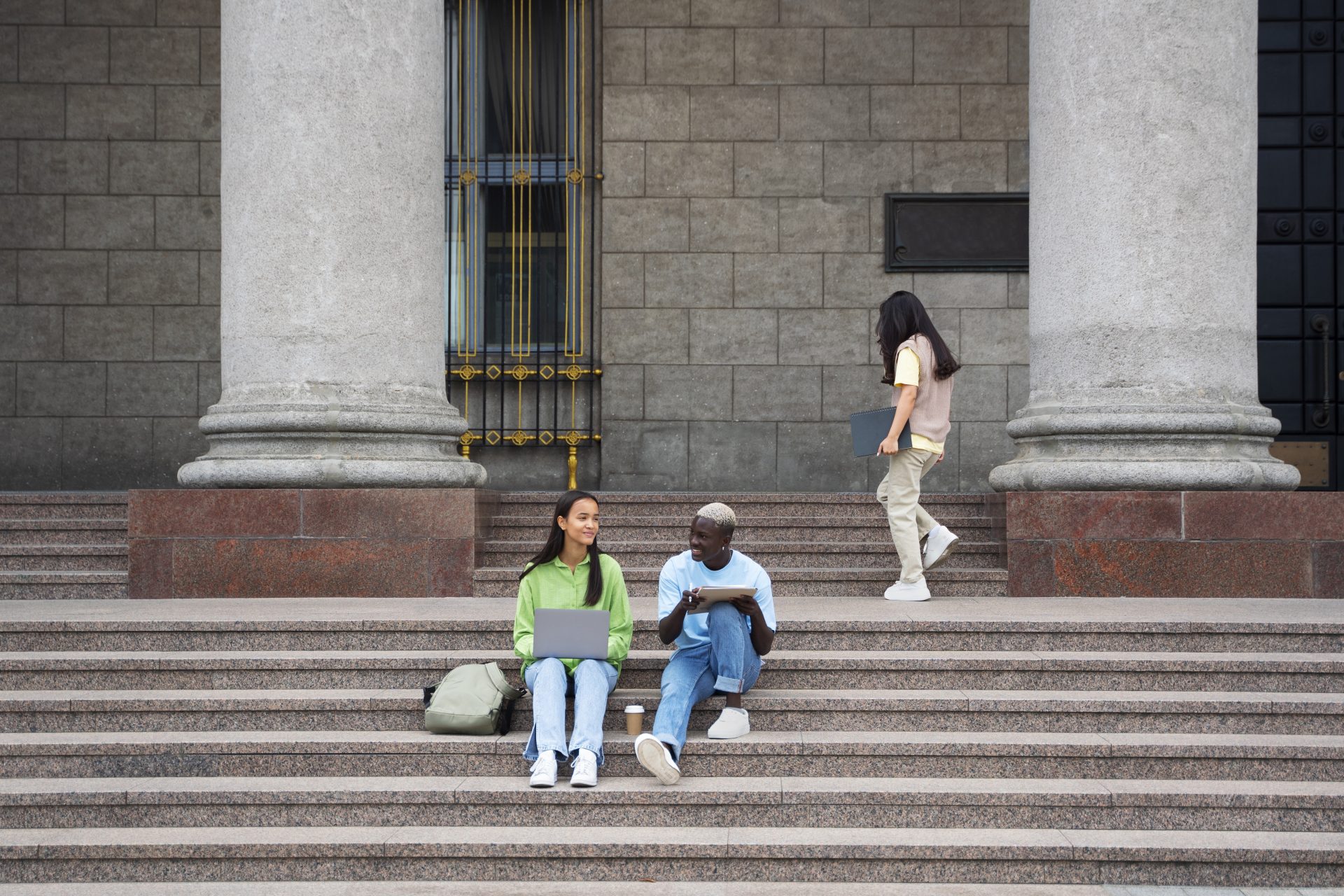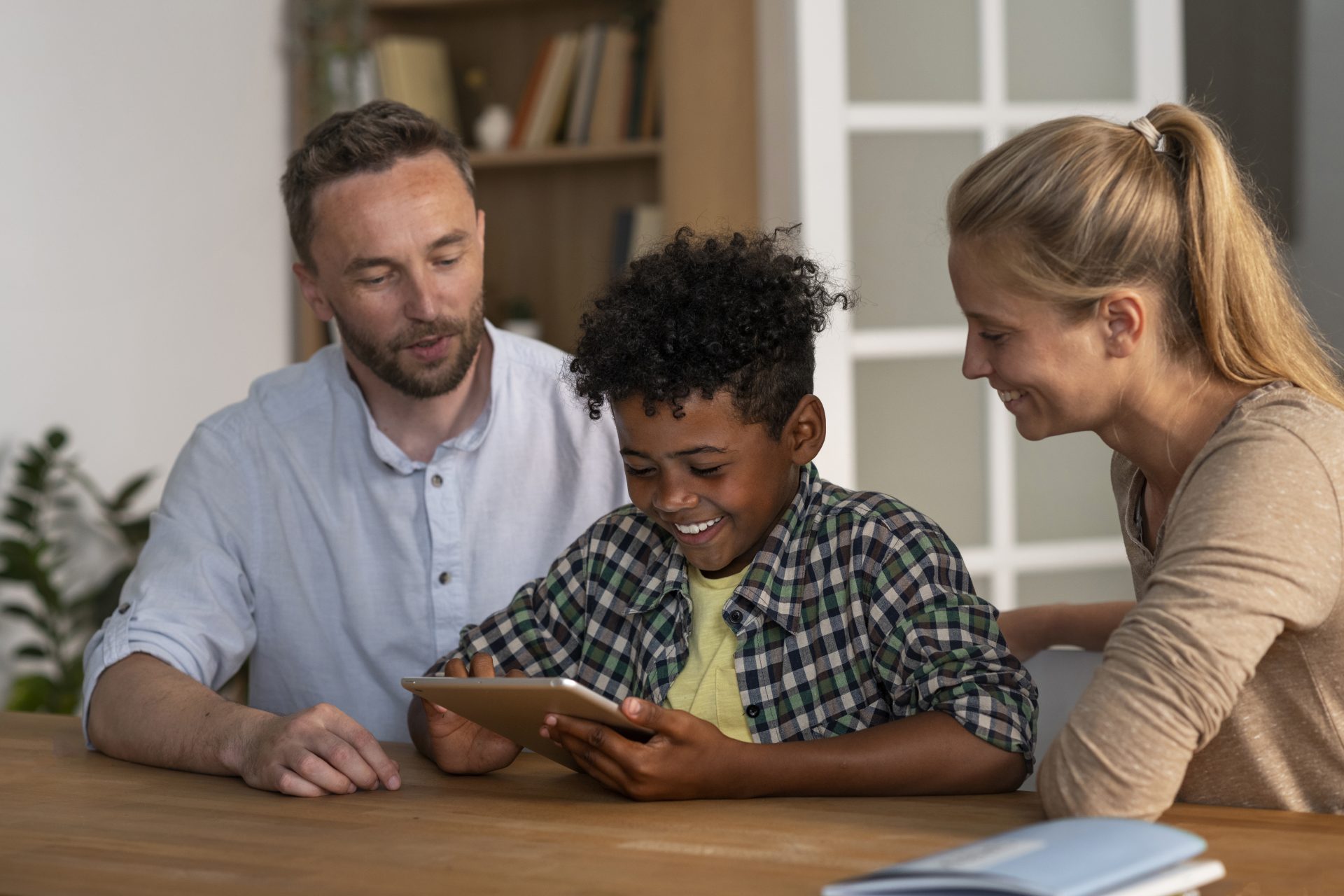Contents
Okulsuz eğitim, Amerika Birleşik Devletleri’nde çocukların kendi hızlarında öğrenmelerini sağlayan eğitime odaklanan bir ev okulu biçimi olarak kabul edilmektedir. Okullaşmanın aksine okulsuz eğitim, çocuğun ilgi ve yeteneklerine dayalı kişiselleştirilmiş öğrenme deneyimlerini teşvik eder. Müfredatı ve testleri vurgulamaktan ziyade okul dışı eğitim, eğitim araçları olarak günlük yaşam deneyimlerine değer verir. Bu eğitim yaklaşımının detaylarını inceleyelim.
Ev okulu düzenlemeleri eyaletlere göre farklılık gösterse de 50 eyaletin tamamında okulsuz eğitime izin verilmektedir. Bazı eyaletler ilerlemenin rapor edilmesini veya belirli konu alanlarının ele alınmasını zorunlu kılabilir. Okulsuz eğitimle uğraşan ailelerin, uyumluluk amacıyla eyaletlerinin ev okulu politikalarını anlamaları ve bunlara uymaları çok önemlidir.
ABD’de Okulsuz Eğitim: Kısa Bir Bakış

Amerika Birleşik Devletleri’nde yaygın olarak uygulanan alternatif bir eğitim türü olan okulsuz eğitim, çocuğun tutkularına dayanan kendi kendine yönlendirilen öğrenmeye odaklanır. Doğuştan gelen merak. Bu yaklaşım, çocuklara ilgilerini çeken konulara dalma ve eğitim çerçevelerine bağlı kalmadan kendi hızlarında ilerleme özerkliği sağlar. Tüm eyaletlerde izin verilen okulsuz eğitim, ailelere çocuklarının öğrenme deneyimini gereksinimlere ve ilgi alanlarına göre özelleştirme özgürlüğü tanır.
Okulsuz eğitimin birincil odak noktası, çocukların dikkatlerini doğal olarak çeken konularla ilgilenmelerine izin vererek öğrenme sevgisini teşvik etmektir. Bu yaklaşım, çocukları gerçek yaşam deneyimlerinin içine çekerek, ister bahçecilik, ister astronomi veya yaratıcı yazarlık olsun, kendileriyle rezonansa giren konuları araştırmaları için onları güçlendirir. Bu tür bir keşfi teşvik ederek, okulsuz eğitim, çocukların bilgi için gerçek bir susuzluk geliştirdikleri ve günlük yaşamlarında büyüme ve öğrenme fırsatları aradıkları içsel bir motivasyon duygusunu besler.
Ayrıca, Amerika Birleşik Devletleri’nde okulsuz eğitimin resmi olarak kabul edilmesi, ailelere kendi inançlarını ve eğitim ideolojilerini yansıtan bir yol belirleme özgürlüğü tanımaktadır. Bu da ebeveynlerin, çocuklarının rutinlerine sorunsuz bir şekilde entegre edilmiş öğrenme deneyimleriyle meşgul olarak akademik ve kişisel olarak başarılı olabilecekleri bir ortam oluşturmalarını sağlar.
Okulsuzluğun temel bir yönü, öğrenmeyi keşif ve faaliyetlere dalma yoluyla organik olarak ortaya çıkan bir süreç olarak görmektir. Eğitimin aksine okulsuz eğitim, öğrencilerin öğrenmeyi günlük yaşam deneyimleriyle iç içe bir yolculuk olarak benimsemelerini teşvik eder. Bu, eğitime kapsamlı bir yaklaşıma katkıda bulunan saha gezileri, toplum hizmeti girişimleri, sanatsal çabalar ve yaşam becerileri edinme gibi girişimleri içerebilir.
Okulsuzluğun temel ilkelerini ve ABD’deki yasal statüsünü tartıştıktan sonra, şimdi ev okulu içindeki uygulamasını ve çocukların büyümesi ve gelişimi üzerindeki etkilerini inceleyeceğiz.
Okulsuzluğu Geleneksel Eğitimden Ayırt Etmek

Okulsuzluğu eğitim yaklaşımlarından ayıran bir unsur olan kendi kendine öğrenme hakkında konuşarak başlayalım. Okulsuz eğitimde çocuklar ilgi alanlarını keşfetme ve dikkatlerini çeken konulara dalma özgürlüğüne sahiptir. Bu, öğrencilerin okul veya bölge tarafından belirlenen önceden belirlenmiş bir müfredata bağlı kaldıkları okul eğitiminin aksine bir durumdur. Okulsuz eğitim, her çocuğun ilgi alanları ve öğrenme yolları ile benzersiz olduğunu kabul eder. Kendi yolculuklarına yön vermelerine izin vererek okulsuz eğitim, çocukları öğrenme deneyimlerinin sorumluluğunu üstlenmeye teşvik eder.
Bu yaklaşım, bir çocuğun çevresini keşfetmeye yönelik doğal eğilimini beslemenin önemini vurgular. Küçüklüğünüzü ve merak duyduğunuz zamanları düşünün – okulsuz eğitim, çocuğun eğitim yolculuğu boyunca doğuştan gelen bu bilgi açlığını sürdürmeyi amaçlar.
Okulsuz eğitim alanlar genellikle müzeleri ziyaret etmek, doğayı keşfetmek ve hatta stajlara katılmak gibi gerçek yaşam deneyimleriyle öğrenirler. Bu çeşitli aktiviteler sınıf görevi görür ve geleneksel ders kitabı derslerinin ötesine geçen uygulamalı bir öğrenme yaklaşımı sunar. Geleneksel eğitim bir sınıfta gerçekleşir. Okulsuz eğitimde ise birçok ortam ve deneyim kullanılır.
Öğrenme Ortamında Esneklik
Okulsuz eğitim, her çocuğun sınıf ortamında başarılı olamayacağını kabul ederek ortamda esnekliği teşvik etmeye odaklanır. Doğası gereği okulsuz eğitim, çocukların gereksinimlerini karşılayan ortamlarda yeteneklerini ve tutkularını keşfetmelerine olanak tanır.
Bu kişiselleştirilmiş öğrenme yöntemi, her çocuğun güçlü ve zayıf yönlerini ele alarak kendi hızlarında gelişebilecekleri bir atmosfer yaratır. Geleneksel okul sistemlerinde sıklıkla görülen yaklaşımdan bir değişimi temsil eder.
Özünde, okulsuz eğitim, öğrenmenin çok yönlü doğasını kabul eden ve kutlayan bütünsel bir eğitim yaklaşımını benimser. Kendi kendine öğrenmeyi teşvik ederek ve farklı öğrenme ortamlarını benimseyerek, okulsuz eğitim, her çocuğun bireyselliğine göre uyarlanmış ve öğrenmeye yönelik gerçek bir sevgiyi teşvik eden bir eğitim yolu sunar.
Şimdi, birçok eyalette okulsuz aileleri etkileyen kurallara odaklanalım.
Eyalet Çapında Okulsuz Eğitim Yönetmeliğine Genel Bakış

Amerika Birleşik Devletleri’nde okulsuz eğitim alanların yönlerini bulmak için çevreyi kavramaları gerekir. Okulsuzluğa ülke çapında izin verilmesine rağmen, her eyaletin evde eğitimle ilgili kendi kuralları olduğunu kabul etmek önemlidir. Bu kurallar, okulsuzların ilerlemelerini nasıl belgeleyecekleri ve takiplerini nasıl organize edecekleri konusunda rol oynar.
Örneğin, bazı eyaletlerde okulsuzlar da dahil olmak üzere tüm ev okulu öğrencileri için geçerli olan raporlama gereklilikleri olabilir. Bu gereklilikler genellikle kaydedilen öğrenme saatleri, öğrenme etkinliklerinin portföyleri veya standart test sonuçları gibi belirli kriterleri içerir. Bu, okulsuz ailelerin yasaların sınırları dahilinde faaliyet gösterdiklerinden emin olmak için bu gerekliliklerin farkında olmaları ve bunlara uymaları gerektiği anlamına gelir.
Bu tür düzenlemeler, okulsuz ailelerin eğitim yolculuklarına yaklaşım biçimlerini etkileyebilir. Daha fazla düzenlemeye tabi eyaletlerde ikamet eden ailelerin, raporlama yükümlülüklerini yerine getirmek için çocuklarının öğrenme deneyimlerinin ayrıntılı kayıtlarını tutmaları gerekebilir. Öte yandan, daha az düzenlenmiş eyaletlerdeki aileler, çocuklarının eğitimine nasıl yaklaştıkları ve belgeledikleri konusunda daha fazla esnekliğe sahip olabilirler.
Örneğin, Pennsylvania’da evde eğitim görenlerin, okul bölgesi müfettişine, çocuklarının akademik yıl boyunca neleri başaracağını özetleyen, ulaşılacak hedeflerin bir listesini içeren bir beyanname sunmaları gerekmektedir. Alternatif olarak, Arizona’da asgari düzenlemeler vardır ve resmi bildirim veya standart değerlendirme gerekliliği yoktur.
Okulsuz ailelerin kendi eyaletlerindeki yasal önkoşulları iyice anlamaları çok önemlidir. Bu anlayış, uygulamalarını eyalet kurallarıyla uyumlu hale getirmelerini sağlar. Bunu, çocukları için özel, telaşsız bir öğrenme deneyimi sağlama taahhütlerini korurken yapabilirler.
Okulsuz aileleri etkileyen çeşitli eyalet yasalarını inceledik. Şimdi, bu yasaların okulsuz ebeveynlerin ve öğrencilerin günlük yaşamlarını nasıl etkilediğini inceleyelim.
Okulsuzluğun Akademik Performans Üzerindeki Etkisi

Okulsuz eğitim, çocukların ilgilerini çeken ve onları heyecanlandıran şeyleri takip ettiklerinde öğrenmede başarılı oldukları fikrine dayanır. Bu yöntem, çocuğun merakını ve tutkusunu ateşleyen konularda hızlandırılmış öğrenme ile sonuçlanabilir. Okulsuz eğitim, çocukların kendi hızlarında ilerlemelerine izin vererek, bir çocuğun doğal yeteneklerinin ve ilgi alanlarının özgürce çiçek açabileceği bir alan yaratır.
Bu kişiselleştirilmiş yaklaşım, çocukların yaş seviyelerinin çok ötesinde konularda uzmanlaşmasıyla olağanüstü akademik başarılarla sonuçlanabilir. Örneğin, astronomiye büyük ilgi duyan bir çocuk, genç yaşta karmaşık astrofizik kavramlarını derinlemesine inceleyerek konu hakkında kapsamlı bir anlayış geliştirebilir. Okulsuz eğitim böylece öğrenmeyi hızlandırır. Öğrencilere zor konuları keşfetmeleri için alan sağlar. Notlar tarafından engellenmiş hissetmezler.
Dahası, bu özel eğitim yöntemi okulsuz çocuklarda güçlü bir bağımsızlık duygusu, eleştirel düşünme ve problem çözme becerileri geliştirir. Öğrenciler, kendilerini gerçekten büyüleyen konularla ilgilenerek motive olurlar. Bu motivasyon, birçok konunun daha derinlemesine anlaşılmasını sağlar. Okulsuz eğitim kapsamında özel olarak tasarlanmış eğitim yolculukları dikkate değer sonuçlar verebilir. Öğrenciler doğuştan gelen merak ve dürtülerini kullanarak kendilerini ileri düzey öğrenmeye doğru iterler.
Üniversite Kabul Kriterleri
Okulsuz eğitim, üniversiteye kabul standartlarıyla uyumluluğunun sorgulanmasına yol açan bir esneklik sunmaktadır. Bu yöntemi benimseyen çok sayıda kişi, kendi benzersiz öğrenme deneyimlerinin özünü sergileyen alternatif portföyler ve değerlendirmeler sunarak yükseköğretim kurumlarında yer edinmeyi başarmıştır.
Okulsuz öğrenciler genellikle gerçek dünya deneyimlerine, kişisel projelere, stajlara ve öz-yönetimli çalışmalara odaklanan alışılmadık portföyler sunarlar. Bu portfolyolar, geleneksel akademik sınırların dışında biriktirilen bilginin derinliğini ve genişliğini sergileyerek, okulsuz eğitim yoluyla beslenen çeşitli beceri ve ilgi alanlarını ortaya çıkarır.
Örneğin, eğitim almamış bir öğrenci, kendi başlattığı çok sayıda yazılım geliştirme projesini ve teknoloji şirketlerindeki stajlarını öne çıkararak bilgisayar programlama konusunda kapsamlı bir uzmanlık sergileyebilir. Uzmanlık alanlarındaki bu tür pratik deneyim ve yeterlilik, yükseköğretime akademik olarak hazır olunduğuna dair ikna edici bir kanıt olarak hizmet edebilir. Üniversitelerin, benzersiz öğrenme yörüngelerini yansıtan alternatif değerlendirmelerin değerini giderek daha fazla kabul ettiği açıktır. Bu kabul, bütünsel değerlendirmelerin değerinin altını çizmektedir. Farklı eğitim yollarını ve başarılarını tanımalıdırlar.
Okulsuz eğitim, çocukların kendi hızlarında öğrenmelerine yardımcı olur. Aynı zamanda benzersiz portföyler oluşturmalarını sağlar. Üniversiteler birçok beceriye sahip dinamik öğrenciler istiyor.
Okulsuz eğitim, uygulamalarını akademisyenlerin ötesinde şekillendiren farklı sosyal etkilere sahiptir. Şimdi dikkatimizi okulsuzluğun kritik bir yönüne, sosyal gelişim üzerindeki önemli etkisine çevirelim.
Okulsuzluğun Sosyal Etkisi
Okulsuz eğitimle ilgili endişeler genellikle çocuğun gelişimi üzerindeki etkisi etrafında dönmektedir. Geleneksel eğitim, çocukların sınıf arkadaşlarıyla kaynaşması için bir rutin sunarken, okulsuz çocuklar çeşitli yaş gruplarıyla kaynaşan ve gerçek yaşam senaryolarıyla yüzleşen topluluklarla etkileşime girmekten yararlanır. Bu maruz kalma, okulsuz gençlerin yeteneklerini ve empatilerini geliştirir.
Topluluk katılımı sayesinde, okulsuz çocuklar çevrelerindeki dünyaya dair daha büyük bir anlayış geliştirirler. Hayatın her kesiminden bireylerle etkileşime girme şansına sahip olurlar, farklı yaş grupları ve sosyal geçmişleri arasında etkili bir şekilde iletişim kurmayı öğrenirler. Bu geniş insan etkileşimi yelpazesi, okulsuz çocuklar toplumlarının dokusuna aktif olarak katıldıkça empati ve anlayış için sağlam bir temel oluşturur.
Dahası, katı sınıf yapılarının yokluğu, okulsuz çocukların yakın akran gruplarının ötesine geçmelerini sağlayarak onları çeşitli yaş ve geçmişlere sahip bireylerle etkileşime girmeye teşvik eder. Bu maruz kalma, sosyal ortamlarda uyum ve esnekliği, giderek çeşitlenen bir toplumda gezinmek için gerekli becerileri geliştirir.
Şimdi yaygın bir yanılgıya değinelim. Okulsuz çocuklar, alışılmadık eğitim yolları nedeniyle genellikle sosyal becerilerden veya özgüvenden yoksun olarak tasvir edilir. Ancak, bu stereotiplerin aksine, birçok okulsuz çocuk kendine güvenen ve kendi kendini motive eden çocuklardır. Farklı sosyal ortamlara kolaylıkla adapte olabilirler.
Okulsuz eğitim, çocukları kendi öğrenmelerini sahiplenmeye ve ilgi alanlarını bağımsız olarak takip etmeye teşvik eder. Sonuç olarak, genellikle güçlü bir öz motivasyon ve esneklik duygusu geliştirirler, bu da başkalarıyla etkileşime girerken kendilerine güvenmelerine katkıda bulunur. Bu özerklik, çocukların zorlukları aksilikler yerine büyüme fırsatları olarak gördükleri bir zihniyeti besler ve sonuçta onları uyarlanabilir ve kendine güvenen bireyler olarak şekillendirir.
Ayrıca, okulsuzluğun doğasında var olan özgürlük, çocukların tutkuları ve yetenekleriyle uyumlu çeşitli aktiviteleri ve hobileri keşfetmelerine olanak tanıyarak derin bir öz farkındalık ve güven duygusunu teşvik eder. Bu kendini keşfetme süreci genellikle birçok sosyal ortamda başarılı olma becerisine yol açar. Okulsuz çocuklar yeni deneyimler ve fırsatlar aramaya alışkındır.
Okulsuz çocuklar farklı topluluklarla ilişki kurarlar. Güçlü yönlerini geliştirirler. Bu da onları uyumlu ve sosyal olarak becerikli kılar. Sosyal gelişimleri hakkındaki yanlış kanılara meydan okuyor.
Okulsuzluğun sosyal gelişim üzerindeki olumlu etkilerini araştırdığımıza göre, şimdi odağımızı bu alternatif eğitim yaklaşımını çevreleyen daha geniş tartışmaları değerlendirmeye kaydıralım.
Okulsuz Eğitim Tartışmasını Analiz Etmek

Okulsuzluğu çevreleyen tartışma, etkilediği toplulukları yansıtan geniş ve çeşitlidir. Bu tartışmanın merkezinde ebeveynlerin sorumlulukları ve çocukların özerkliği yer almaktadır. Bu konular ideolojiler, pratik uygulamalar ve toplumsal sonuçlarla yakından ilişkilidir. Destekçiler okulsuzluğu çocukların öğrenimine özgürleştirici ve organik bir yaklaşım olarak görmektedir. Eleştirmenler ise akademik becerilerdeki eksiklikler ve ebeveyn seçimlerinin çocuğun eğitim yolculuğu üzerindeki etkisiyle ilgili sorunları gündeme getirmektedir.
İlk olarak, okulsuz eğitimde ebeveyn sorumluluğu kavramını ele alalım. Ebeveyn katılımının seviyesi bu tartışmanın odak noktasıdır. Bazıları okulsuzluğun ebeveynlere büyük bir yük getirdiğini ve çok yönlü bir eğitim sağlama yeterliliklerini sorguladığını savunuyor. Diğerleri ise ebeveyn katılımının daha güçlü bir ebeveyn-çocuk bağını ve çocuklarının öğrenme ihtiyaçlarını daha iyi anlamalarını teşvik ettiğini savunmaktadır.
Çocukların özerkliğini tartışmak, bağımsızlık ile çocukların gerekli akademik bilgileri edinmesini sağlamak arasında denge kurmak konusunda tartışmalara yol açan okulsuzluğun bir yönüdür. Savunucuları, çocukların kendi öğrenmelerine rehberlik etmeleri için güçlendirilmelerinin, öz motivasyonlarını ve eleştirel düşünme yeteneklerini geliştirdiğini savunmaktadır. Ancak eleştirmenler, bilgi eksiklikleri ve çocuğun gelecekteki beklentileri üzerindeki uzun vadeli etkileri konusunda endişelerini dile getirmektedir.
Bu tartışmaların, bir eğitimi neyin tanımladığına dair farklı yorumlar etrafında döndüğünü kabul etmek çok önemlidir. Bazıları müfredatı başarı için hayati önemde görürken, diğerleri bireysel ilgi alanlarına ve kişisel gelişime öncelik veren geleneksel yöntemleri desteklemektedir. Her iki taraf da argümanlarını desteklemek için araştırma bulgularından ve kişisel anekdotlardan yararlanarak kendi görüşlerini tutkuyla savunuyor.
Bu tartışmada yolumuzu bulmak, alternatif eğitim ortamını şekillendirmede ebeveynler, eğitimciler ve politika yapıcılar gibi paydaşların rollerini tanımamızı gerektirmektedir. Bu perspektifleri inceleyerek okulsuz eğitim söylemi içindeki dinamikleri daha iyi anlayabiliriz.
Legacy Online School’da çocuğunuzun gelecekteki başarısı bizim öncelikli hedefimizdir. Bizi ziyaret edin web sitesi Legacy çevrimiçi okulundaki birçok fırsatı keşfetmek için.
Legacy çevrimiçi okul programlarına göz atın:
Legacy Online School’un ilköğretim okulu program çıtayı yükseltiyor. Bu kaliteli bir eğitimdir. Merakı ateşlemek için çalışıyoruz. Ayrıca yaratıcılığı teşvik etmeye çalışıyoruz. Güçlü bir müfredat sunuyoruz. Bu konuda bize nitelikli eğitimciler yardımcı oluyor.
Legacy Online Ortaokulu dijital eğitim sağlar. Ortaokul öğrencileri için tasarlanmıştır. Okul, sertifikalı öğretmenler tarafından verilen canlı çevrimiçi dersler sunmaktan gurur duymaktadır. Sınıflar çevrimiçi ve etkileşimlidir.
Legacy Online Lisesi lise öğrencileri için özenle tasarlanmış benzersiz bir çevrimiçi öğrenme yöntemidir. Eşzamanlı öğrenmeyi, çok çeşitli pedagojik yöntemleri ve erişilebilirliğe yapılan vurguyu bir araya getirir.
Legacy çevrimiçi okulu en iyisini sunar müfredat
Titiz müfredatımız, mezunların dünyanın dört bir yanındaki üniversitelere ve iş yerlerine iyi bir şekilde hazırlanmasını sağlar. Ayrıca, canlı sanal kulüplerimiz dünyanın dört bir yanındaki öğrencileri birbirine bağlamaktadır.





